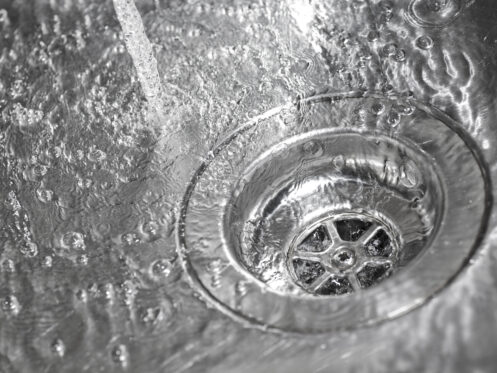Even with the rise of air fryers and convection oven cooking, many residents of San Jose, CA regularly indulge in greasy, fatty foods. If you love homemade burgers, rashers of bacon, and french fries, it’s important to know how to dispose of the resulting oils. Whether piping hot or cold and solidified, these things should never enter your plumbing system.
How Grease, Rendered Fats, and Cooking Oils Affect Residential Plumbing
Both shortening and rendered fats like bacon grease and beef tallow harden as they cool. They can create solid blockages in pipes and eventually clog sewer lines. Greasy residues can additionally harbor dangerous, odor-causing bacteria and other germs.
Cooking oil residues in pipes can also turn into tough, tacky coatings that attract and retain other waste. These buildups gradually diminish the diameter of pipe interiors such that both solid waste and wastewater have less room to move through.
Putting used cooking oils and fats down your drains can result in blocked pipes, slow-moving drains, and unpleasant drain odors. It can also increase your likelihood of developing troublesome drain bug infestations.
How Cooking Oils Affect the Natural Environment
Even oils with a lower fat content, such as vegetable oil, canola oil, and peanut oil, can cause significant problems in your plumbing system and the environment. Although these oils do not solidify in drains like rendered fats, they can still lead to tough, tacky buildups in pipes, creating the conditions for blockages, backups, and infestations. Beyond the issues they cause within plumbing systems, the most significant concern with used cooking oils is their impact on the natural environment.
When cooking oil clears your plumbing system, it can seep out of cracked sewer pipes and enter local soils and groundwater. This infiltration can lead to several environmental issues. Soils saturated with cooking oils can develop dangerous bacteria that harm animals, insects, and plants. Additionally, these soils may lose their natural absorption abilities, disrupting local ecosystems. According to the Environmental Protection Agency (EPA), improper disposal of cooking oils can contaminate water sources, posing risks to both wildlife and human health.
In addition, cooking oils can cause problems at local water treatment facilities or within your home’s septic system. At water treatment facilities, oils and fats can create blockages and interfere with the treatment process, leading to higher operational costs and potential environmental hazards. In septic systems, oils can clog drain fields and reduce the system’s efficiency, ultimately leading to system failure and costly repairs. Proper disposal and management of cooking oils are crucial to protect both plumbing systems and the natural environment.
Common Myths Concerning Cooking Oil Disposal
When it comes to disposing of cooking oil, many homeowners are guided by myths that can lead to significant plumbing issues. One common misconception is that it’s safe to pour cooking oil down the sink as long as you wash it down with hot water. However, this practice can lead to severe clogs. As the oil cools, it solidifies and sticks to the pipes, trapping food particles and other debris. Over time, this buildup can cause blockages that are difficult and costly to remove.
Another prevalent idea is that adding dish soap when disposing of oil or grease in a garbage disposal will effectively break it down and prevent any plumbing problems. While this method seems logical, it is a myth. Dish soap can temporarily emulsify the oil, but once it enters your plumbing system, the oil will separate and congeal. Additionally, garbage disposals are not designed to handle oils and will suffer damage over time.
What to do With Oils and Grease From Cooking
When it comes to cooking, dealing with leftover oils and grease can be an annoying task for many homeowners. While disposing of these byproducts improperly can lead to plumbing issues and environmental harm, there are several ways to manage them responsibly. The easiest way is to throw cooking grease and used oil into the garbage. However, you can also recycle or reuse them.
Throwing Used Oil and Grease Away
The first step in getting rid of cooking oil is letting it cool. You can leave hot oils in the pans you used them in until they reach room temperature, or you can drain them into heat-safe, glass, or metal containers. Liquid oils that don’t solidify unless frozen should reach room temperature and be cool to the touch. Rendered fats and fatty oils like coconut oil should reach a solid state before disposal.
San Jose allows residents to dispose of cooking oil, grease, and rendered fats in the trash. For solids, you can use an old coffee can or glass jar with a sufficiently tight lid. However, according to San Jose Recycles, cooking oil must be treated with a solidifier before being thrown directly into garbage bags or waste bins.
You can find solidifiers at local home and hardware stores at an affordable cost. Sold as powders, they have a rapid, clumping effect. Adding just one to two tablespoons of an oil solidifier to your cooking waste will give it the same consistency as a cooled, rendered fat. As an additional benefit, these naturally derived mixtures make it possible to dispose of used oils along with all other organic food waste. However, you should never place your used oils into a compost bin or pile.
Reusing Cooking Oils
Contrary to popular belief, you can use most cooking oils more than once. Vegetable oil, canola oil, coconut oil, and grapeseed oil all have relatively high smoke points. Thus, these oils don’t undergo significant, adverse chemical changes after a single use. The best way to protect the natural environment and limit your food waste is by straining these oils after they’ve cooled and then storing them in airtight containers for reuse.
Getting Rendered Fats Ready for Reuse
After frying a pound of bacon or ground beef, pour the resulting fat into a heat-safe bowl. Once it’s lost a fair amount of heat but before it hardens, add a cup of lukewarm water and stir. This will cause all of the oil’s impurities to fall to the bottom of the dish while the newly cleaned fat or tallow rises to the top. Place the bowl in your refrigerator to expedite solidification. Once the fat has solidified, remove it and dump out the water and collected impurities. You can remelt this fat and repeat the process multiple times to achieve the desired purity level.
San Jose Recycles
If you have a large deep fryer and produce multiple quarts of used cooking oil at a time, it’s best to find a nearby drop-off site. Depending upon the quality and quantity of cooking oil you wish to dispose of, San Jose Recycles may accept it free of charge. This and other local agencies collect used cooking oil for bio-diesel, plastics manufacturing, and other recycling and repurposing projects.
Contact the Professionals
Even when you properly deal with cooking oils and grease, your plumbing system can still develop issues due to these substances. Cooking oil and grease flow down drains when washing dirty pots and other dishes. They combine with soap residue, toothpaste, and other personal care products. Consider scheduling professional drain cleaning with Plumbtree Plumbing & Rooter at least once a year to clear your pipes out. We also offer leak detection, plumbing repair, and sewer repair services. Contact us today to make an appointment with one of our experienced plumbers.

